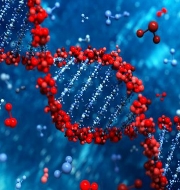Scientists create world's smallest thermometer from DNA
Scientists have developed world’s Smallest (Nano) Thermometer using DNA (Deoxyribonucleic acid) structures that can fold and unfold at specifically defined temperature functions.
It was developed by the scientists at the University of Montreal and the study report in this regard was published in the journal Nano Letters.
Key facts
- The world’s smallest thermometer is 20,000 times smaller than a human hair and is fully programmable.
- It was developed using basic idea of the DNA molecules which unfold when heated to certain temperatures. RNA, proteins and other bio-molecules in the DNA fold and unfold.
- With this idea researchers engineered DNA structures that are capable of folding and unfolding at specific temperatures making it nano-scale temperature signalling device.
- Significance: It can help in understanding of natural and human designed nanotechnologies by enabling to measure temperature at the nanoscale.
- It can be incorporated in new electronic devices and has a wide range of applications across fields of chemistry and physics.
- Play a crucial role in answering a number of debatable questions in the field of science and technology.
- It may be used to create super-strong structures, repair cells and help nano-computing become more efficient.
- Help in understanding biological functions better and opens new avenues in the developing field of nanotechnology.
Month: Current Affairs - May, 2016


